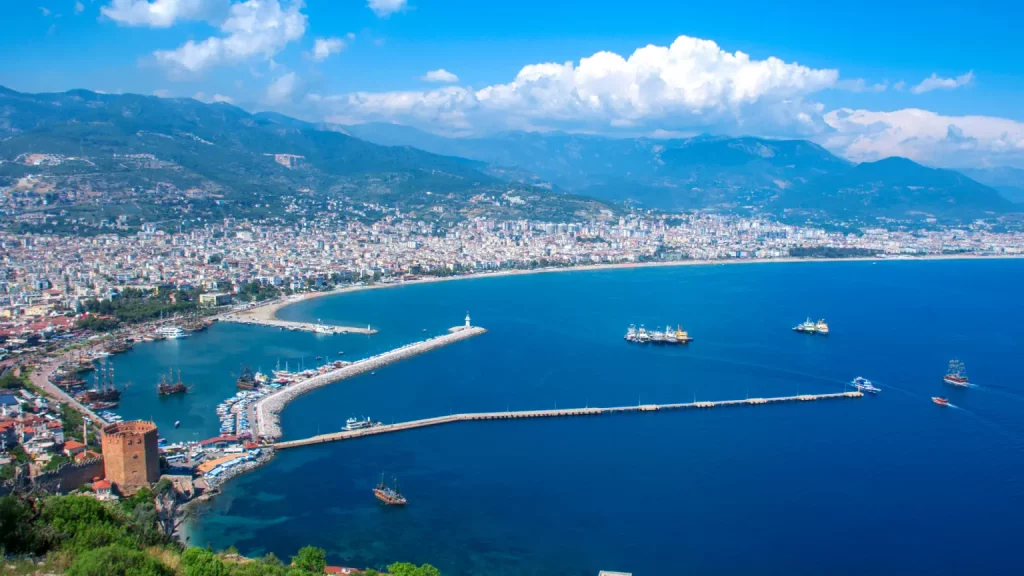Tax is one of the most critical and complicated issues for property owners in any country. As such, Astons experts have compiled a concise and easy-to-understand guide with basic information about Turkish property taxes.
Before delving into the tax issues, we recommend reading our regular research report on the Turkish property market in 2024 to understand the current market situation better.
Fundamentals of the tax system in Turkiye
The central tax authority in Turkiye is the Tax Administration. It is subordinate to the Ministry of Finance and deals with all important issues:
- Issuing tax residency documents.
- Handling income tax returns.
- Issuing fines for failure to pay taxes on time.
Types of taxes in Turkiye
Taxes can be divided into three groups:
- Direct income taxes – personal income tax, corporate income tax, capital gains tax.
- Indirect taxes and levies – VAT, consumption tax, banking and insurance transaction tax, stamp duty, import tariffs.
- Wealth taxes – estate tax, inheritance tax, gift tax.
Taxes related to real estate
When buying a property
- Title transfer tax is 4%. Technically, it should be divided and paid equally between the buyer and the seller, but commonly, the buyer pays the entire amount.
- VAT on the purchase of new-construction properties:
- 1% for flats up to 150 square metres;
- 8% for flats larger than 150 square metres;
- 18% for commercial premises.
- Stamp duty — between 0.1% and 0.6% of the property’s value.
- The state fee for the issuance of a title deed (tapu):
- 9,757* liras for non-residents;
- 5,906* liras for residents.
You can get a VAT exemption when buying your first property in Turkiye. To qualify, you must pay for the property from a foreign account, and the property must be purchased through a property developer.
Buying property in Turkiye entails tax obligations but can also open the way to acquiring Turkish residency. How? Find out in our expert guide – Residence Permit in Turkiye in 2024.
Taxes on real estate ownership
Twice a year, property owners pay taxes to the local municipality. In spring (the end of May) and autumn (the end of November).
The amount of the tax depends on the value of the property according to the cadastre:
- In ordinary cities: 0.1%-0.3%
- In large cities (population greater than 750,000): 0.2%-0.6%
There is also a luxury tax on real estate valued at more than 12 million Turkish liras [approx. $350,000]. It is calculated according to a special scale*:
- 12.88 – 19.32 million lire: 0.003%
- 19.32 – 25.76 million lire: 0.006%
- More than 25.76 million lire: 0.010%
Taxes on the sale of real estate
A capital gains tax is only paid if a property is sold within 5 years of its purchase. The amount depends on the profit made*:
- up to 13,000 lire – 15%;
- 13,000 to 30,000 lire – 20%;
- 30,000 to 110,000 lire – 27%;
- more than 110,000 lira – 35%
Investors with long-term visions and goals of investing in Turkish real estate may be interested in the Turkish citizenship for investment program, The Process of Obtaining Turkish Citizenship.
How to pay taxes
- Through a cash desk at the tax office
- Online via the tax service website
- In the mobile app of a Turkish bank
- At the cash desk of the municipality where the property is located
- Online on the website of the municipality
*The last two methods are suitable for payment of property ownership tax
You need a Vergi Numarasi – a Turkish tax identification number – to pay taxes in Turkiye. Foreigners can get theirs at the local tax office or online at the tax office’s website. A person’s tax number is linked to their passport number.
How to avoid double taxation
Turkiye has Double Taxation Treaties [DTT] with 85 countries that help eliminate double taxation, including:
- Canada
- Israel
- Japan
- EU countries
- South Korea
- The US
- The UK
- United Arab Emirates
- South Africa
- New Zealand
- Singapore
DTTs protect you from paying tax on the same income twice in different countries.
Summary
Turkiye’s tax system in terms of property is simple and transparent.
We hope this guide has helped you to understand it, but it is important to remember that laws can change.
To get the most current understanding of the Turkish property market, residency, or citizenship, schedule your Free Consultation with Astons specialists.
We will answer all your questions, find suitable properties, calculate the costs of buying and maintaining a property, and help you complete the entire process – from consultation to property ownership to residency/citizenship.
*Information is current as of 2024.
FAQ about Buying, Maintaining, and Selling Real Estate in Turkey
- What are the main costs associated with buying real estate in Turkey?
The main costs include property purchase tax, VAT, legal fees, notary fees, and agent commissions. - What taxes do I need to pay when buying property in Turkey?
You need to pay property purchase tax, VAT, and other local taxes. - What are the ongoing maintenance costs for real estate in Turkey?
Ongoing maintenance costs include utility bills, property management fees, and regular upkeep expenses. - Are there any costs associated with selling real estate in Turkey?
Yes, selling costs include capital gains tax, legal fees, agent commissions, and other administrative costs. - How can I estimate the total cost of buying and maintaining a property in Turkey?
By considering all the taxes, legal fees, maintenance costs, and potential repair expenses. - What should I consider when planning to sell my property in Turkey?
Be aware of the taxes, agent fees, and legal costs associated with selling. - Is property insurance mandatory in Turkey?
While not always mandatory, it is highly recommended to protect your investment. - What legal fees should I expect when buying real estate in Turkey?
Legal fees typically include notary fees, lawyer fees, and other administrative costs. - How much should I budget for property maintenance in Turkey?
This depends on the property’s size, location, and condition but should include regular upkeep and occasional repairs. - Are there any hidden costs when buying real estate in Turkey?
Always check for any additional administrative fees, local taxes, or unexpected legal costs. - What are the benefits of investing in Turkish real estate?
Benefits include potential rental income, property value appreciation, and various economic incentives offered by the Turkish government. - Can foreigners buy real estate in Turkey?
Yes, foreigners can buy property in Turkey, although there are certain restrictions and requirements. - What is the process of buying property in Turkey?
The process involves selecting a property, conducting due diligence, signing a sales contract, and completing the legal and financial transactions. - How do I find a reliable real estate agent in Turkey?
Look for agents with good reviews, proper licensing, and a strong track record in the Turkish real estate market. - What are the risks of buying property in Turkey?
Risks include market fluctuations, legal issues, and potential problems with property management. Conduct thorough research and work with reputable professionals. - What documents are required for buying property in Turkey?
Required documents typically include a valid passport, tax identification number, property title deed, and proof of payment. - How can I finance my property purchase in Turkey?
Financing options include mortgages from Turkish banks, personal savings, or loans from international lenders. - What is the typical timeframe for buying property in Turkey?
The process can take anywhere from a few weeks to several months, depending on the complexity of the transaction and the responsiveness of the involved parties. - Are there any restrictions on property ownership for foreigners in Turkey?
Foreigners may face restrictions on purchasing property in certain regions or zones, particularly near military areas. - How do I ensure the property I am buying is legally clear?
Conduct a thorough legal check through a qualified lawyer to ensure the property is free of any legal issues or encumbrances.











